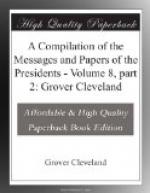JAMES MADISON.
VETO MESSAGE.
WASHINGTON, January 30, 1815.
To the Senate of the United States:
Having bestowed on the bill entitled “An act to incorporate the subscribers to the Bank of the United States of America” that full consideration which is due to the great importance of the subject, and dictated by the respect which I feel for the two Houses of Congress, I am constrained by a deep and solemn conviction that the bill ought not to become a law to return it to the Senate, in which it originated, with my objections to the same.
Waiving the question of the constitutional authority of the Legislature to establish an incorporated bank as being precluded in my judgment by repeated recognitions under varied circumstances of the validity of such an institution in acts of the legislative, executive, and judicial branches of the Government, accompanied by indications, in different modes, of a concurrence of the general will of the nation, the proposed bank does not appear to be calculated to answer the purposes of reviving the public credit, of providing a national medium of circulation, and of aiding the Treasury by facilitating the indispensable anticipations of the revenue and by affording to the public more durable loans.
1. The capital of the bank is to be compounded of specie, of public stock, and of Treasury notes convertible into stock, with a certain proportion of each of which every subscriber is to furnish himself.
The amount of the stock to be subscribed will not, it is believed, be sufficient to produce in favor of the public credit any considerable or lasting elevation of the market price, whilst this may be occasionally depressed by the bank itself if it should carry into the market the allowed proportion of its capital consisting of public stock in order to procure specie, which it may find its account in procuring with some sacrifice on that part of its capital.
Nor will any adequate advantage arise to the public credit from the subscription of Treasury notes. The actual issue of these notes nearly equals at present, and will soon exceed, the amount to be subscribed to the bank. The direct effect of this operation is simply to convert fifteen millions of Treasury notes into fifteen millions of 6 per cent stock, with the collateral effect of promoting an additional demand for Treasury notes beyond what might otherwise be negotiable.
Public credit might indeed be expected to derive advantage from the establishment of a national bank, without regard to the formation of its capital, if the full aid and cooperation of the institution were secured to the Government during the war and during the period of its fiscal embarrassments. But the bank proposed will be free from all legal obligation to cooperate with the public measures, and whatever might be the patriotic disposition of its directors to contribute




